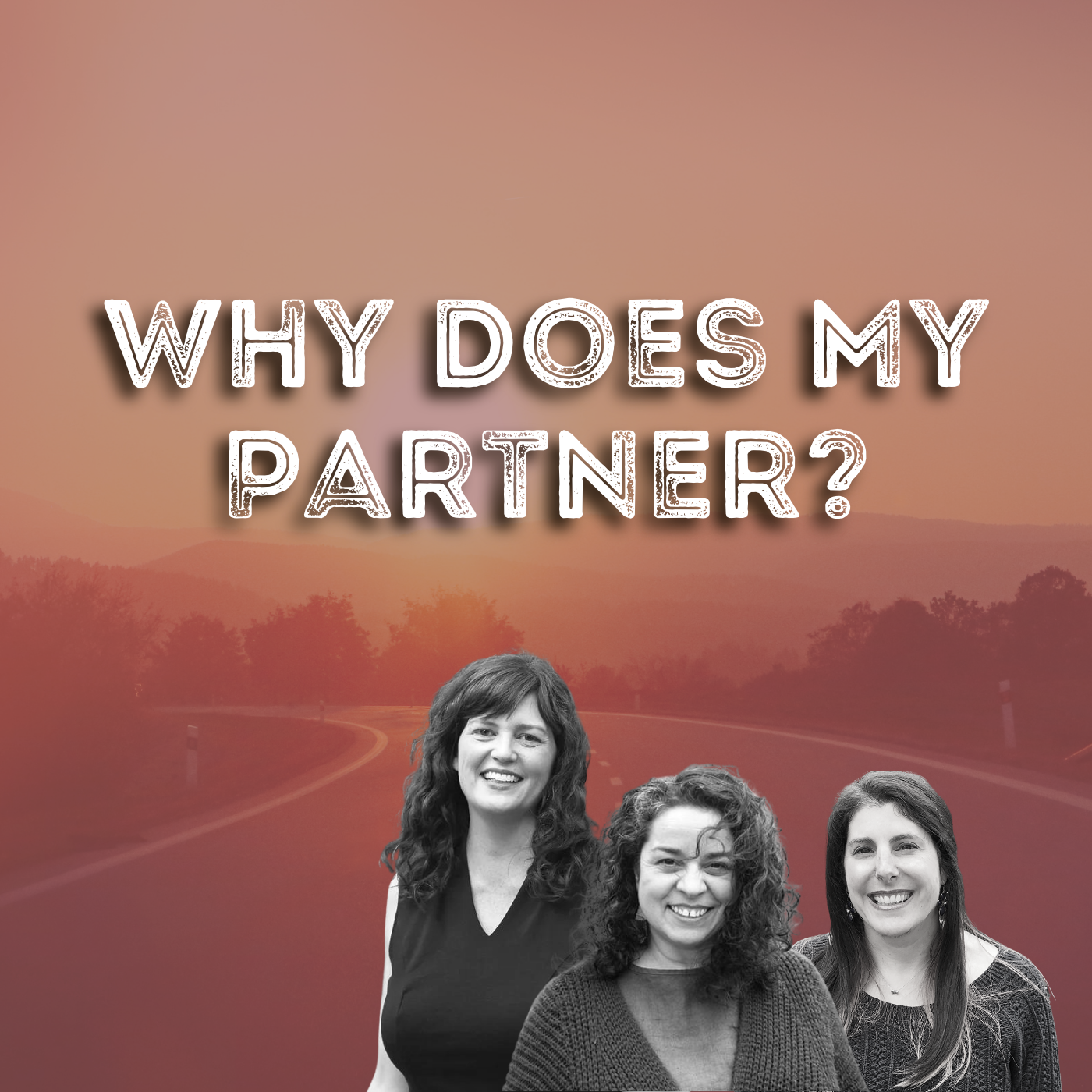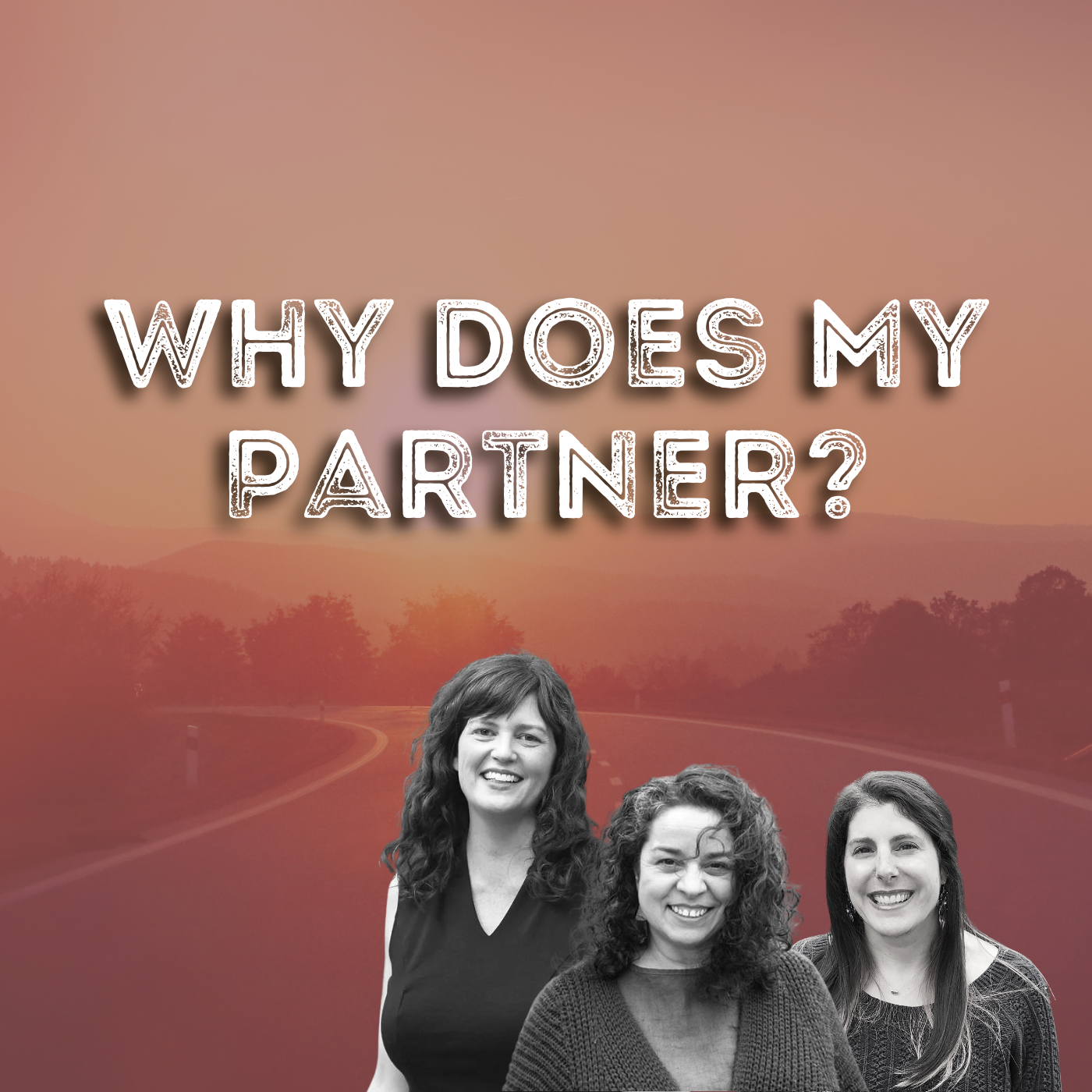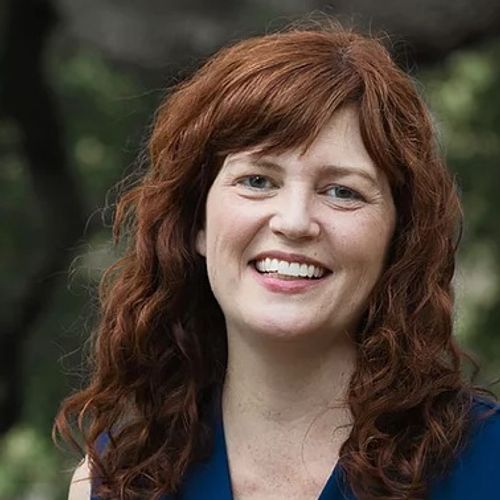Episode 98
Why does my husband not see things in our house that are askew?
Our brains are taking in an incredible 11 million bits of information per second! Thank goodness we’ve got our salience neural network - system of neural connections -- that filters all of that down to an amount we can actually take in and process! But that also means that there’s actually a whole lot going around us that we never perceive on a conscious level. So how do our brains decide what to take in or not? What happens when your partner’s salience network isn’t taking in exactly the same things as yours? It’s episode 2 of season 6 of the Why Does My Partner Podcast, enjoy!
Quotes:
"What is emotionally relevant to you is [most likely] different than what's emotionally relevant to your partner…so if you want to change it, you need to join each other and make it emotionally salient for both of you."
This episode is brought to you by Therapy Wisdom.
Jules' new book is out now! Buy Setting Boundaries that Stick: How Neurobiology Can Help You Rewire Your Brain to Feel Safe, Connected, and Empowered wherever books are sold.
Share your questions with us at whydoesmypartner.com/contact
If you want to dive in deeper, consider attending our upcoming workshops. Learn more at whydoesmypartner.com/events
Transcript
Welcome to the Why Does My Partner podcast.
Rebecca:I'm Jules.
Rebecca:I'm Vicki.
Rebecca:And I'm Rebecca.
Rebecca:We're your hosts.
Rebecca:We're also couples therapists and messy humans bumbling through
Rebecca:our own relationships every day.
Rebecca:We
Vickey:met at a training, and our secret sauce is that we, and
Vickey:our partners, became fast friends.
Vickey:Between us, we have more than 40 years of experience holding hard
Vickey:relational questions with our clients.
Vickey:We're going to bring those questions here.
Jules:And together, we're going to take a stab at answering those questions.
Jules:This podcast is not a substitute for couples therapy.
Jules:If something you hear in this podcast stirs something deep within you
Jules:about your relationship, reach out to a couples therapist in your area.
Rebecca:We also love to hear your questions, so don't forget
Rebecca:to go over to whydoesmypartner.
Rebecca:com to leave a question of your own.
Rebecca:Here's today's question.
Jules:Welcome back!
Jules:This is Jules.
Jules:This is
Rebecca:Vicki.
Rebecca:And this is Rebecca.
Rebecca:And here's today's question.
Rebecca:Why does my husband not see things in our house that are askew?
Rebecca:Broken curtain rods.
Rebecca:Shower curtains hanging off rods.
Rebecca:Spilled coffee on the floor, weeds in the yard.
Rebecca:Hmm.
Jules:Ooh.
Jules:I don't either.
Jules:See, some people don't.
Jules:And I don't know, but Jules is going to tell us why.
Jules:There is actually, there is actually reason for this.
Jules:Um, well, first of all, I want to give a nod to the possibility
Jules:that it's not that he doesn't see.
Rebecca:That's possible.
Rebecca:It might just be that he doesn't care the way you do.
Jules:Or it may be that he knows, like, in his implicit memory system,
Jules:not in an out loud or conscious way, that that's not his problem.
Jules:Right?
Jules:It's not that it may not be that he's not saying it, but also it
Jules:may be that he's not saying it.
Jules:So why would this be happening?
Jules:Well, Wow.
Jules:I want to talk about the salience neural network.
Jules:So the salience neural network is a really vast network and
Jules:it happens all over your brain.
Jules:It's not in the specific part of your brain.
Jules:This is really important to understand.
Jules:And I'm about to use a metaphor and that metaphor does not imply in
Jules:any way that there are actual nets.
Jules:Yes, there are.
Jules:So there are not, there are not nets in your brain.
Jules:That's not true.
Jules:But also, so your salience neural network has to do this funky job.
Jules:Everybody breathe for a second with me.
Jules:This is wild.
Jules:Your lower brain, your medulla oblongata, which is the bottom of your brainstem
Jules:is taking in about 11 million bits of information per second, 11 million
Jules:bits of information per second.
Jules:Inside your body.
Jules:Mm-Hmm.
Jules:outside your body.
Jules:Huh?
Jules:But that's like,
Vickey:and like if I'm looking at the computer right now, which I
Vickey:am, which is true that like the 11 million bits is that I'm literally
Vickey:seeing, um, text that is black.
Vickey:So that would be like at least two bits, right?
Vickey:Like it's the every single one of those things.
Vickey:Mm-Hmm.
Vickey:is another bit of information, right?
Vickey:Mm-Hmm.
Vickey:that 11 million entails all those details.
Jules:Yeah.
Jules:All those little details.
Jules:Right.
Jules:But it's still a lot of information.
Jules:It's still a lot of information.
Jules:That's
Rebecca:a lot of information.
Rebecca:And they're not, like, let's just be clear that those 11 million bits are
Rebecca:taken in implicitly, like unconsciously.
Rebecca:We're not really conscious of all the information we're taking in.
Jules:Mm hmm.
Jules:Exactly.
Jules:Because by the time it gets up to the part of your brain that's doing more
Jules:conscious stuff, that part of your brain is processing somewhere between 5
Jules:and 60 bits of information per second.
Jules:So you need a network that's going to decide which of the 11 million
Jules:bits should become the 5 to 60
Vickey:bits.
Vickey:I can't even fathom that.
Vickey:We have a need for it.
Jules:A salience neural network.
Jules:Now how does a salience neural network process information?
Jules:It is guessing mostly based on emotional potency and
Jules:relevance to you and your goals.
Jules:When you look ahead at the computer, Vic, you're going to see different stuff.
Jules:Different stuff is going to jump out to you.
Jules:Then it will to me.
Jules:So like, for example, here's something my brain just did funny with our computers.
Jules:I can see everyone here and each one of us has plants in our backgrounds.
Jules:That is what I just noticed.
Jules:What did you just notice?
Jules:Something different.
Jules:Even though we are looking at the same screen.
Jules:Rebecca has a plant?
Jules:I just, I just asked my brain.
Vickey:Yeah, it's right there in the corner.
Vickey:I can't even see it from here.
Jules:It's a plant.
Vickey:There's a literal plant.
Vickey:I literally don't see it.
Vickey:That's hilarious.
Vickey:See?
Vickey:I have a plant right there.
Vickey:This is what I'm talking about.
Vickey:Mine is smaller.
Vickey:I know why.
Vickey:Oh, well here.
Vickey:Would this help you then?
Vickey:Nope.
Vickey:Still can't see it.
Vickey:Can you see it better now?
Vickey:Well, maybe.
Vickey:I did when I, when I, um,
Rebecca:closed the chat box.
Rebecca:Yeah, when you opened it up.
Rebecca:Yeah.
Rebecca:Yeah.
Rebecca:See.
Rebecca:Oh, there you go.
Rebecca:You know what, you know what I see?
Rebecca:I see that we all have microphones.
Rebecca:And also, this is weird.
Rebecca:We all have eyes.
Vickey:How Jolton spit out her drink with that, I don't
Jules:know.
Jules:But yes.
Jules:No.
Vickey:But I'm also going to say that had the screen been this
Vickey:big, I don't know that I would have noticed the plant anyway.
Vickey:So Jules, I totally hear what you were saying.
Vickey:Exactly.
Vickey:This is what I'm talking about.
Jules:We all see different stuff all the time.
Jules:And so
Jules:it's really tough to be married.
Jules:Because one of the things that's going to happen is you will be paying
Jules:attention to different data inside of a single scenario all the time.
Jules:And so what your salience neural network is catching and feels emotionally
Jules:potent to you and relevant, basically.
Jules:Uh, it's not necessarily the same as what your partner sees.
Jules:So probably part of what's going on, if they really don't see it, is that for
Jules:whatever reason, they are not marking that as emotionally potent enough
Jules:information to make it through the filter.
Jules:So you'll, you'll have probably all had this experience if you've been
Jules:super into a band all of a sudden.
Jules:You hear their music everywhere, or you see advertisements on the
Jules:road for them, or if you, or if you're researching buying a car.
Jules:I've always heard this example.
Jules:I've never noticed it before, but all of a sudden there are Honda CRVs everywhere.
Jules:So weird.
Jules:I never noticed them, but they're everywhere, right?
Jules:And it's because my brain has been spending hours on the computer
Jules:researching Honda CRVs and my brain went.
Jules:Okay.
Jules:I guess this is emotionally relevant data.
Jules:We'll feed up for you.
Jules:And so, so one thing that can help if you are in a position with
Jules:your partner, and it is really important that you share a vision.
Jules:Of a scene.
Jules:You can see if it's possible to share the emotional potency of the relevant
Jules:data for you with your partner and see if they can join you in adding
Jules:emotional potency to the data you would like them to pay attention to.
Rebecca:So let's talk about what that looks like, like in action, let's,
Rebecca:let's, let's do a little bit of a
Jules:play.
Jules:Okay.
Jules:Um, can I tell you?
Jules:Yeah, go ahead.
Jules:Go ahead.
Jules:Yeah.
Jules:No, no, you know, you go, you
Rebecca:go.
Rebecca:Well, sweetie, every time I walk through the kitchen and I noticed that the sink
Rebecca:is still full, my heart skips a few beats and I feel this like clenching happening
Rebecca:in my chest and I start to simultaneously wonder if I'm in this all by myself.
Rebecca:And think that I'm not doing a good enough job at just human ink.
Rebecca:And I feel really alone.
Jules:Wait, this is about dishes?
Jules:Uh huh.
Rebecca:What?
Rebecca:Can, can you help me out here?
Rebecca:Cause, like, maybe if, if we both notice that the sink is full, then I won't have
Rebecca:to carry the weight of that all by myself.
Jules:You want me to notice the sink is full?
Jules:That
Rebecca:would help me a lot.
Rebecca:What do you
Jules:want me to do when I notice it?
Jules:That was my next
Rebecca:question.
Rebecca:Well, maybe we could both work on cleaning the dishes?
Rebecca:Oh,
Jules:when I don't see it, you feel like on your own.
Jules:Yeah, that's it.
Jules:Oh, well, babe, I don't want that.
Jules:There you go.
Jules:So notice it took a little bit of back and forth.
Jules:Don't give up right away.
Jules:It took a little bit of back and forth as we were playing that out.
Jules:For me to add my own emotional potency.
Jules:It can't be your emotional potency.
Jules:It's got to be my emotional
Rebecca:potency.
Rebecca:But I have to give you enough information that you understand why that would
Rebecca:even be something for you to register.
Rebecca:Right.
Rebecca:Because if I'm not going into the space of what is happening inside
Rebecca:of me, then you're not going to have that information because of
Rebecca:course that's not happening inside
Jules:of you.
Jules:Right.
Jules:It's not.
Jules:I didn't even notice the dishes.
Jules:Right.
Jules:I was thinking about this in my own world.
Jules:And by the way, I'm about to tell you about There is, I have never
Jules:successfully changed this in my family.
Jules:I have salient data in my system.
Jules:It's gonna be good.
Jules:I have never successfully handled this.
Jules:We have a pantry problem in my house.
Jules:So I am slowly coming to terms with maybe I have some stuff with, with
Jules:my brain and how it's organized, organizing stuff, but I get really hyper
Jules:organized or I cannot find anything.
Jules:That's not an ADHD cover or anything, is it?
Jules:Anyway, that's neither here nor there at the moment.
Jules:I'm like getting this.
Jules:I'm like, wait a second.
Rebecca:There's something different happening in my brain.
Rebecca:I'm sitting here like walking through your pantry in my brain right now.
Rebecca:Like I'm, I'm in there and I'm, I'm going, Oh, I love this pantry and I love how
Rebecca:it's organized and I know that this goes here and that goes there and I know I can
Rebecca:find this over here and like, I'm already like, I know your pantry better than mine.
Rebecca:It is perfect.
Rebecca:That's because
Jules:it's perfect.
Jules:And everything has spots.
Jules:Every time I've been there, yes.
Jules:It's labeled.
Jules:It's labeled.
Jules:I
Vickey:wish people could
Jules:see this right now.
Jules:Here's the problem.
Jules:If it is not where it should be,
Vickey:I literally cannot
Jules:see it.
Jules:And so I think we are out of it, and I go buy more at the store,
Jules:and so we have triple things.
Jules:Now here's what happens with my family.
Jules:My family does not believe it is important to put things on the
Jules:shelf where they're supposed to be.
Jules:And that is how paint ends up next to cereal in my house.
Jules:So every three months, I take the entire pantry apart and put it back
Jules:together so that I can find shit again.
Jules:I'm not kidding.
Jules:I'm just sitting here thinking, God
Rebecca:bless your family, because I've had conversations with Adam
Jules:about your pantry.
Jules:Totally.
Jules:Totally.
Jules:And what I've come to, honestly, this is my journey with it, is I've come
Jules:to a space of accepting that this is actually emotionally potent data for
Jules:me, but not for anyone else in my house.
Jules:I'm just going to let it go.
Jules:And if I want the pantry to be like I want it, then every
Jules:three months I will redo it.
Jules:Because I've tried to help them see the emotional importance of this and
Jules:they have never joined me on that.
Jules:And they don't actually even see what I'm talking about.
Jules:By the way, well it's right
Rebecca:there.
Rebecca:Every time I come home from your house, I reorganize my
Jules:pantry.
Jules:That's because my pantry is small.
Jules:I love your pantry so much
Rebecca:that I reorganize mine when
Jules:I get home every single time.
Jules:Does yours stay that way though?
Jules:No, because nobody in
Rebecca:my family cares about keeping it that way, except for me.
Rebecca:And so I get inspired to do it whenever I go visit Jules.
Rebecca:And I sit in front of her pantry going, Ahhhh.
Rebecca:It's so soothing.
Rebecca:And then I come home.
Rebecca:You can see where
Jules:everything is.
Rebecca:It's perfectly organized.
Rebecca:I did not even look at it.
Rebecca:And you've always organized it before I get there.
Rebecca:See?
Vickey:Emotionally salient
Jules:data for Rebecca.
Jules:Not emotionally salient.
Jules:She's never even seen that my pantry is so well organized.
Jules:I've never seen it not organized.
Jules:Vic doesn't even know.
Jules:I know.
Jules:Vic doesn't even know
Vickey:that that's a thing.
Vickey:See, she's looking at us like, well, I've been into this
Jules:pantry.
Jules:I didn't walk into it and I'm feeling very left out.
Jules:I don't
Rebecca:know that you've ever seen me do this because I actually, like,
Rebecca:you're teaching sometimes, right?
Rebecca:Or I'm, you're doing something else and I'm sitting in your pantry going, oh, wow.
Rebecca:It's because it's so
Jules:perfectly organized.
Jules:It soothes my brain.
Jules:Yeah.
Jules:Yeah.
Jules:It soothes mine too, by the way.
Jules:Yeah.
Jules:Yeah.
Jules:Totally.
Jules:I find things when they're in order and in logical categories
Rebecca:very soothing.
Rebecca:Very much so.
Rebecca:It's funny, like, like, uh, I noticed that there are things in my house
Rebecca:too that like everybody in my house can walk by and nobody can notice,
Rebecca:but I can't walk by and not notice.
Jules:Yeah, sometimes I walk into our bathroom or into the kitchen and all
Jules:the doors of our cabinets are open.
Jules:And I'm like, how did
Vickey:no one else in our house realize that all the
Vickey:cabinets in this room are open?
Vickey:How
Jules:do
Rebecca:people leave my house and not turn off the lights?
Rebecca:How do they leave all
Vickey:the lights on?
Vickey:I'm totally the outlier here.
Vickey:I leave the lights on sometimes
Jules:and I leave, no, I leave all the lights on.
Jules:I'm the one, I'm the one who leaves all the lights on in my house.
Jules:So, but get this, one day, one time.
Jules:Stella and Adam were on the road overnight.
Jules:They went on a little trip.
Jules:And I, cause I've been in my head blaming them for leaving all my cabinets open.
Jules:Oh, did you do it to yourself?
Jules:Yes.
Jules:I totally did it to myself.
Jules:I'm It's salient data to me, and in other moments, clearly it is sex.
Rebecca:That fights.
Rebecca:I'm so sorry that happened.
Jules:Oh, I think it's weird.
Jules:It's awesome.
Jules:But it just, it's like another moment of like, come back to your humanity, Jules.
Jules:This is being human.
Jules:So, sweet color.
Rebecca:Why does, why does your partner not see things
Rebecca:in your house that are askew?
Rebecca:Because salient data.
Rebecca:Neur networks
Jules:and what is emotionally relevant to you is different than what's
Jules:emotionally relevant to your partner.
Jules:And so probably that's what's going on.
Jules:You wanna change it, you got it.
Jules:Yeah.
Jules:If you, if you to shift it with what, yeah.
Jules:You need to, you need to join each other and make it emo, emotionally
Jules:salient data for both of you.
Jules:If you can, then you'll start noticing.
Jules:So if you happen to be.
Jules:in a position where you could be the partner of this caller.
Jules:You could take this data, make a little U turn and go, huh, I wonder
Jules:what my partner would like me to pay attention to that maybe I'm missing.
Jules:You could even ask them later.
Jules:I also, that would be wild.
Vickey:I also wonder and.
Vickey:I don't think this is part of the salience network.
Vickey:So I'm very, very lucky that this is not, um, well, it does
Vickey:bother Dave, but not that much.
Vickey:That, um, at night I am not one of those adults or women who
Vickey:have to clean the kitchen after dinner or have to, like, I am not.
Vickey:Or if we entertain on a Sunday, I will literally leave everything
Vickey:because I don't see clients on Mondays and I will clean them on Mondays.
Vickey:And it shocks my father in law to no end because my mother in law can't do that.
Vickey:So we walk into the other room and he's like, Vicki, are you?
Vickey:I'm like, no, no, no, no.
Vickey:It'll wait till tomorrow and I can just leave it.
Vickey:And again, thank goodness it doesn't bother Gabe.
Vickey:I got to tell you guys though, the more of my own.
Vickey:Work I'm doing with multiple sources of therapy.
Vickey:Um, I have bizarre sources of therapy, but, um, I'm starting to do the dishes.
Vickey:after dinner and not minded or anything.
Vickey:It's not a burden.
Vickey:I'm just doing it.
Vickey:And I'm like, Oh, my brain isn't shutting down the way that it used to.
Vickey:So it just has me wondering about this partner.
Vickey:Like if there's any kind of shutting down process, I don't know.
Vickey:I'm just throwing that out there.
Vickey:And again, I'm lucky.
Vickey:Oh, I love
Rebecca:the curiosity.
Rebecca:Yeah.
Jules:And I'm
Vickey:lucky that Gabe, it doesn't make his head explode that.
Vickey:Cause I do, it's really bad on Monday nights cause I see clients like you
Vickey:guys on Tuesdays and Wednesdays.
Vickey:If I leave dishes Monday night, that kitchen could be a nightmare
Vickey:till Thursday and he handles it and he doesn't get mad at me,
Jules:but if it really bothered him, he would, he would Clean the dishes.
Jules:Well, I own the
Jules:kitchen.
Vickey:That's a whole different argument, a whole different
Vickey:agreement that we guys had.
Vickey:So I did need to point, I was saying that quietly, but I do need to point that out.
Vickey:That's an actual verbal agreement between us.
Vickey:Long story.
Vickey:He's not allowed to do that.
Vickey:Well, no, it's just that I, oh, he could, that would not be a problem,
Vickey:but that I told him from the beginning that I would own the kitchen.
Vickey:So that's a whole other thing.
Vickey:And sometimes he does do it and sometimes he gets resentful.
Vickey:So that's a whole other thing.
Vickey:But so that's what I mean by the shutting down.
Vickey:So I'm just.
Jules:Yeah, no, there could be something else going
Vickey:on with
Jules:the,
Rebecca:with this partner.
Rebecca:I think that, that there is something tangible in there.
Rebecca:Mm-Hmm.
Rebecca:to kind of play with.
Rebecca:Mm-Hmm, hmm.
Rebecca:. And there's another way that this shows up in my home, which is that I have this
Rebecca:network that, like, if I walk around and I see an empty glass, I'm gonna pick it up.
Rebecca:You know, I'm gonna, I'm gonna pick it up and I'm gonna go clean
Rebecca:it or put it in the dishwasher.
Rebecca:Mm-Hmm.
Rebecca:or something like that.
Rebecca:Even if it's in use.
Rebecca:For the rest.
Rebecca:Well, how do you know that if no one else is like sitting there next to it, right?
Rebecca:And so there are lots of people in my home who they leave empty glasses
Rebecca:and stuff around the house thinking that they're going to use them again.
Rebecca:And then I.
Rebecca:Pick them up.
Rebecca:You know, I'm the one who had picked, already picked them up.
Rebecca:And so, I'm learning to attune, right, to the fact that maybe I
Rebecca:need to consider and ask, oh, is this something you're still using?
Rebecca:Mm hmm.
Rebecca:Mm hmm.
Rebecca:But that's like.
Rebecca:That's a whole piece of work that I had to kind of unfreeze from.
Rebecca:That's why I'm kind of like bringing this in now, because I had to unfreeze
Rebecca:from and go, Oh, don't just be in like autopilot all the time, Rebecca.
Rebecca:Like actually slow down and check in with the other people
Rebecca:that you share a home with.
Jules:That's a beautiful way to
Vickey:phrase it too.
Vickey:Actually check in with the other people that you share a home with.
Jules:Well, and it's not like you were being oblivious, really.
Jules:You were, you were paying attention to a thing.
Rebecca:I was paying attention to a glass.
Rebecca:I wasn't paying attention to the relationship.
Jules:Correct.
Jules:Fair.
Jules:You were, you were paying attention to this piece of data,
Rebecca:not this piece of data.
Rebecca:Right.
Rebecca:I wasn't thinking about who's using the glass.
Rebecca:I was thinking about empty glass, clean it up.
Rebecca:Mm hmm.
Rebecca:Wow.
Rebecca:But that actually has an impact on the people I'm around when, you know, all
Rebecca:the glasses are now in the dishwasher.
Jules:You're a glass selector.
Vickey:You're a glass
Rebecca:selector.
Rebecca:I'm also the reason they're all clean.
Rebecca:You are.
Jules:I
Vickey:like it.
Vickey:You are very true.
Vickey:I'm also a glass
Jules:collector, but mine are only all half used on my nightstands, 20 of them.
Jules:I would love to come and clean them up.
Jules:You may.
Jules:Come on over.
Jules:All
Rebecca:right, let's leave this here.
Rebecca:So good talking to you all, and we'll be back next week.
Jules:Bye.
Jules:See you next time.
Jules:That wraps up this week's episode.
Jules:Join us again next week for another Why Does
Rebecca:My Partner?
Rebecca:We hope that you continue to listen wherever you get your audio
Rebecca:and that you'll follow the show.
Vickey:To go deeper, join us at one of our workshops.
Vickey:You'll find our next date at whydoesmypartner.
Vickey:com.
Jules:Did you know you can ask us your questions?
Jules:Your questions
Vickey:are relational gold.
Rebecca:Go to why does my partner.
Rebecca:com to either write in or record your question for a future
Jules:episode.
Jules:And here's some gratitudes.
Jules:Thanks to Al Hubberman, our sound editor and podcast production magic maker.
Vickey:Thanks to every one of you who has joined us for our workshops in the past.
Vickey:We've learned so much from
Rebecca:all of you and thanks to everyone who's reviewed the show
Rebecca:and Apple podcasts, your reviews, help others to find the show.
Rebecca:Take care of each other best.
Rebecca:You can see you
Jules:next time.
Jules:Mhm.




